What is Vascepa?
Vascepa is a prescription medicine used:
- along with certain medicines (statins) to reduce the risk of heart attack, stroke, and certain types of heart issues requiring hospitalization in adults with heart (cardiovascular) disease, or diabetes and 2 or more additional risk factors for heart disease.
- along with a low-fat and low-cholesterol diet to lower high levels of triglycerides (fats) in adults.
It is not known if Vascepa changes your risk of having inflammation of your pancreas (pancreatitis).
It is not known if Vascepa is safe and effective in children.
Who should not take Vascepa?
Do not take Vascepa if you are allergic to icosapent ethyl or any of the ingredients in Vascepa. See the end of this leaflet for a complete list of ingredients in Vascepa.
What should I tell my healthcare provider before taking Vascepa?
Before taking Vascepa, tell your doctor about all of your medical conditions, including if you:
- have diabetes.
- have a low thyroid problem (hypothyroidism).
- have a liver problem.
- have a pancreas problem.
- are allergic to fish or shellfish. It is not known if people who are allergic to fish or shellfish are also allergic to Vascepa.
- are pregnant, or planning to become pregnant. It is not known if Vascepa will harm your unborn baby.
- are breastfeeding or plan to breastfeed. Vascepa can pass into your milk, and may harm your baby. Talk to your doctor about the best way to feed your baby if you take Vascepa.
Tell your doctor about all the medicines you take, including prescription and over-the-counter medicines, vitamins, and dietary or herbal supplements. Vascepa can interact with certain other medicines that you are taking.
Especially tell your doctor if you take medicines that affect your blood clotting (anticoagulants or blood thinners).
How should I take Vascepa?
- Take Vascepa exactly as your doctor tells you to take it.
- Do not change your dose or stop taking Vascepa without talking to your doctor.
- Do not take more capsules than what is prescribed by your doctor.
- If you are prescribed the 0.5-gram capsules, you should not take more than 8 capsules each day.
- If you are prescribed the 1-gram capsules, you should not take more than 4 capsules per day.
- Take Vascepa capsules whole. Do not break, crush, dissolve, or chew Vascepa capsules before swallowing.
- If you miss a dose of Vascepa, take it as soon as you remember. However, if you miss one day of Vascepa, do not double your dose when you take it.
- Your doctor may start you on a diet that is low in saturated fat, cholesterol, carbohydrates, and low in added sugars before giving you Vascepa. Stay on this diet while taking Vascepa.
- Your doctor may do blood tests to check your triglyceride and other lipid levels while you take Vascepa.
What are the possible side effects of Vascepa?
Vascepa may cause serious side effects, including:
- Heart rhythm problems (atrial fibrillation and atrial flutter). Heart rhythm problems which can be serious and cause hospitalization have happened in people who take Vascepa, especially in people who have heart (cardiovascular) disease or diabetes with a risk factor for heart (cardiovascular) disease, or who have had heart rhythm problems in the past. Tell your doctor if you get any symptoms of heart rhythm problems such as feeling as if your heart is beating fast and irregular, lightheadedness, dizziness, shortness of breath, chest discomfort, or you faint.
- Possible allergic reactions if you are allergic to fish or shellfish. Stop taking Vascepa and tell your doctor right away or get emergency medical help if you have any signs or symptoms of an allergic reaction.
- Bleeding. Serious bleeding can happen in people who take Vascepa. Your risk of bleeding may increase if you are also taking a blood thinner medicine.
If you have liver problems and are taking Vascepa, your doctor should do blood tests during treatment.
The most common side effects of Vascepa include:
- Muscle and joint pain.
- Swelling of the hands, legs, or feet.
- Constipation
- Gout
- Heart rhythm problems (atrial fibrillation).
These are not all the possible side effects of Vascepa. Call your doctor for medical advice about side effects. You may report side effects to FDA at 1-800-FDA-1088.
Vascepa Images
General information about the safe and effective use of Vascepa.
Medicines are sometimes prescribed for purposes other than those listed in a Patient Information leaflet. Do not use Vascepa for a condition for which it was not prescribed. Do not give Vascepa to other people, even if they have the same symptoms that you have. It may harm them. You can ask your pharmacist or healthcare provider for information about Vascepa that is written for health professionals.
How should I store Vascepa?
- Store Vascepa at room temperature between 68° to 77° F (20° to 25° C).
- Safely throw away medicine that is out of date or no longer needed.
Keep Vascepa and all medicine out of the reach of children.
What are the ingredients in Vascepa?
Active ingredient: icosapent ethyl
Inactive ingredients: tocopherol, gelatin, glycerin, maltitol, sorbitol, and purified water
For more information, go to WWW.VASCEPA.COM or call 1-855-VASCEPA (1-855-827-2372).






